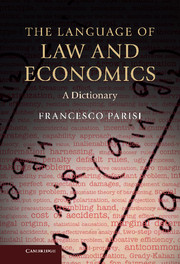O
Published online by Cambridge University Press: 04 August 2017
Summary
Oates’ decentralization theorem: see decentralization theorem.
Observation learning: see informational cascades.
Observational studies: see controlled experiment.
Ockham’s razor: a heuristic for evaluating theories, stating that, when presented with two competing theories, A and B, that explain phenomenon X with equivalent explanatory strength, the “simpler” theory should be preferred. This principle is occasionally used in the law and economics literature to encourage scholars to refrain from unnecessary complexity in their analysis and in the formulation of hypotheses. As a general statement, Ockham’s razor raises a number of philosophical problems. First, what is a “theory”? Second, what is “explanatory strength”? Third, what is “simple”? There are no quick answers to these vexing and profound philosophical questions. For practical purposes, it suffices (a) that scientific theories (inclusive of economic theories) are abstract models linked to the real world by sentences expressing hypotheses; (b) that the explanatory strength involves some correlation between predictive success and comprehensiveness; and (c) that simplicity correlates with fewer assumptions. In scientific practice (and in the study of law and economics), Ockham’s razor is rarely useful in comparing two fully worked-out theories. Rather, it is most useful at the theory-building stage, as a practical principle guiding the construction of models. The designation derives from the medieval philosopher William of Ockham (c. 1285–c. 1348), though the attribution is dubious; no express declaration of the principle exists in Ockham’s work (Brampton, 1964). While Ockham’s preoccupation with ontological parsimony was acutely consonant with the gist of the heuristic that bears his name, it is doubtful that any philosopher or scientist would prefer multiplying entities beyond necessity. Its normative force is therefore questionable, since everyone seems inclined to parsimony anyway. Finally, it bears keeping in mind that, in philosophy, Ockham’s razor is often taken to have particular significance in metaphysics, in which it may (albeit controversially) carry descriptive weight. However, in the sciences, Ockham’s razor is merely a practical, normative principle about how one ought to build a model, ceteris paribus. See also assumptions, robustness, and falsifiability.
- Type
- Chapter
- Information
- The Language of Law and EconomicsA Dictionary, pp. 206 - 213Publisher: Cambridge University PressPrint publication year: 2013



